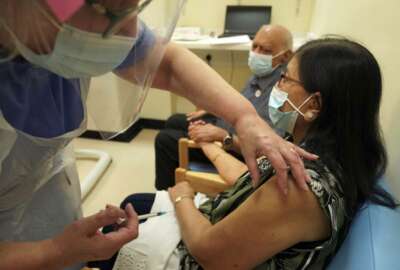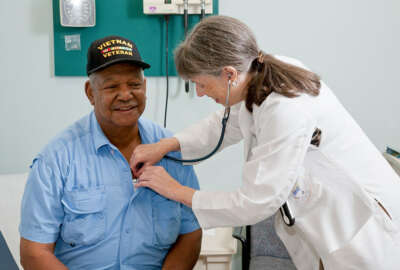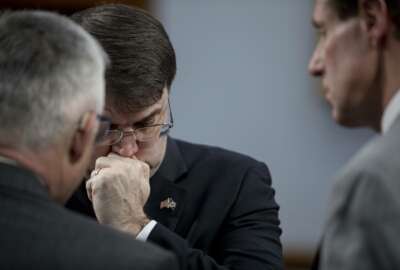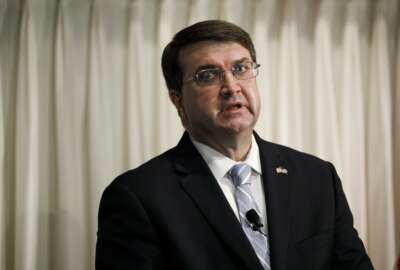
VA warns of ‘long process’ to distribute COVID-19 vaccine to employees and veterans
The Department of Veterans Affairs ordered 73,000 doses of the Pfizer COVID-19 vaccine and is preparing to distribute them whenever the Food and Drug Administration...
Update: The Department of Veterans Affairs released a preliminary COVID-19 vaccine distribution plan Thursday morning on Dec. 10, 2020. The plan lists the 37 VA sites that will administer the Pfizer vaccine once it receives approval from the Food and Drug Administration. The list can be found here.
The Department of Veterans Affairs is preparing to distribute a COVID-19 vaccine as soon as it’s approved, but the agency acknowledged Wednesday it may initially struggle to reach healthcare workers and veterans in remote and rural locations.
VA so far has ordered 73,000 doses of the Pfizer vaccine and another 122,000 doses from Moderna, said Richard Stone, the department’s acting undersecretary for health. Both COVID-19 vaccines require two shots per person.
The Pfizer vaccine, which is currently under review at the Food and Drug Administration, may receive emergency-use authorization by the end of the week.
Once it does receive authorization, VA is expecting a shipment of Pfizer doses nationwide, possibly as soon as this weekend, Stone said.
“Can you handle the distribution, and then is that an adequate amount for the largest healthcare system in the nation?” Jon Tester (D-Mont.), ranking member of the Senate Veterans Affairs Committee, said Wednesday at a hearing on VA’s COVID-19 response.
“It is not an adequate amount, and this will be a long process for us to reach all 7 million veterans who we believe will want vaccination from us, as well as all 400,000 employees of the agency,” Stone told the committee. “We do anticipate weekly distribution, and it remains to be seen how robust that weekly distribution will be.”
VA hasn’t yet released a comprehensive COVID-19 vaccine distribution plan, but it has offered a few details in a series of frequently-asked-questions for veterans posted on its website. VA health care employees at highest risk of contracting COVID-19 will receive the vaccine first.
Committee members are especially interested in VA’s distribution plan, with some expressing some concern that the department hadn’t released one publicly.
The Pentagon on Wednesday described its plans under a pilot program to distribute an initial 44,000 doses to 16 military sites, where mostly defense health workers will be first line to receive them.
“Our vaccine plan is with the CDC,” Stone said. “That vaccine plan is still dependent on our ability to move the Pfizer vaccine, which requires a -70 degrees Fahrenheit refrigeration and freezing, across the nation.”
As of Wednesday, 37 VA sites were equipped with the proper freezers needed to support the Pfizer vaccine. Stone said he’s expecting a shipment of another 36 freezers, meaning VA may eventually have a total of 73 sites that are equipped to receive an initial shipment of Pfizer vaccines, once it’s approved.
“We do anticipate that shipment will occur across the nation, and then it will depend upon on whether we can secondarily ship that -70 degree vaccine further,” Stone said of the Pfizer doses. “That decision has not been made by CDC, which is why you haven’t seen our really robust vaccine distribution plan.”
The department also has 188 sites that can accept the Moderna vaccine once it’s approved, Stone added.
All VA medical centers have completed simulation exercises, where they’ve walked through how they might distribute, receive and then administer the COVID-19 vaccine. The department does have some practice in distributing and administering new vaccinations, Stone reminded senators.
VA has annual influenza inoculation program, and it’s administered 1 million flu shots to veterans so far this year.
Still, Stone said he’s especially concerned about VA’s ability to deliver the COVID-19 vaccine to rural and remote locations. The 73 sites VA anticipates it will have to administer an approved vaccine from Pfizer aren’t nearly enough, and Stone said the department will have to rely on the Moderna supply to reach more remote facilities.
“This morning… I had a conversation about our ability to obtain short-runway aircraft to go into rural areas, where we could bring small amounts of vaccine into those rural areas where there’s 20, 30, 50 or 100 veterans,” Stone said. I believe we’re going to need to have that kind of creativity and innovation in order to deliver this effectively.”
Like the rest of the country, VA is experiencing a surge in active COVID-19 cases, though Stone said the department had beds and spots within its intensive-care units open and available for veterans and members of the public.
VA on Wednesday was tracking 16,449 active cases, including 1,300 employees. A total of 77 employees within the Veterans Health Administration have died from complications due to COVID-19 since the start of the pandemic, according to the department’s public data.
To respond to the pandemic, VHA received $17.4 billion through the Coronavirus Aid, Relief and Economic Security (CARES Act) back in March. VA’s health administration has spent about $8 billion of that so far, but Stone said he anticipates needing more resources.
“We’ll consume the rest of that through the rest of this fiscal year, but I do believe that there’s a lot we can’t see about vaccine distribution,” he said. “I think we’re still probably three-to-four weeks ahead of the peak of what we’re going to see in this escalation of cases across the nation.”
Beyond the additional funding, VA is hopeful Congress will also extend additional authorities that helped the department more quickly hire new health professionals.
Stone described the hiring waivers VA received from the Office of Personnel Management as “absolutely critical” in helping the department bring on more than 66,000 new employees since the pandemic began.
“Should we expire in those authorities, it will make it very difficult for us to sustain this workforce in the manner that we have,” he said.
Copyright © 2025 Federal News Network. All rights reserved. This website is not intended for users located within the European Economic Area.
Nicole Ogrysko is a reporter for Federal News Network focusing on the federal workforce and federal pay and benefits.
Follow @nogryskoWFED
Related Stories

VA says onboarding changes made during the pandemic will ‘change the way we hire forever’





